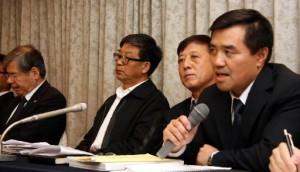Report published on Chinese laborers forced to work in Hiroshima Prefecture during World War II
Oct. 24, 2014
by Gosuke Nagahisa, Staff Writer
On October 18, a press conference was held in downtown Hiroshima to announce the publication of a report on Chinese forced laborers. During World War II, Chinese nationals were forcibly taken to the construction site of the Yasuno Power Plant, located in the Akiota area in Hiroshima Prefecture. The report describes how they were put to work under oppressive conditions, the lawsuit for damages that was filed against the Nishimatsu Construction Company, and the efforts that have been made to resolve the issue following a settlement. Eight members of the steering committee of the "Nishimatsu Yasuno Friendship Fund," which is based in Tokyo and composed of former laborers, their relatives, and lawyers, stressed the efforts made regarding postwar reparations. They are hoping that the report will help improve ties between Japan and China.
The report shows head-and-shoulder photos and information involving 248 people, whose whereabouts are known, among some 360 forced laborers. It describes how they were taken to the construction site and the conditions they worked under. After the settlement was reached in October 2009, committee members met with former laborers and family members to conduct interviews.
The steering committee, which is supported by the 250 million yen paid to settle the matter, has erected a stone monument near the power plant and invited family members of former laborers to Hiroshima in addition to issuing compensation money to former laborers and surviving family members. With their major aims now completed, the committee decided to compile a report. The A-4 size report in two languages, Japanese and Chinese, runs 492 pages, and 1,350 copies have been made. They will be sent to surviving relatives and Japanese groups which lent support to the lawsuit.
Qu Qi jie, 47, a member of the committee, lost his uncle in 1944. Mr. Qu, from Tsingtao, China, said, “I will donate copies of the report to my country’s government and local schools. I want people to know the facts of history.” Masatoshi Uchida, the chair of the steering committee of the fund, commented, “While relations between Japan and China are not very good, this experience getting projects done at the private level will help solve various problems in settling matters after the war.”
(Originally published on October 19, 2014)
On October 18, a press conference was held in downtown Hiroshima to announce the publication of a report on Chinese forced laborers. During World War II, Chinese nationals were forcibly taken to the construction site of the Yasuno Power Plant, located in the Akiota area in Hiroshima Prefecture. The report describes how they were put to work under oppressive conditions, the lawsuit for damages that was filed against the Nishimatsu Construction Company, and the efforts that have been made to resolve the issue following a settlement. Eight members of the steering committee of the "Nishimatsu Yasuno Friendship Fund," which is based in Tokyo and composed of former laborers, their relatives, and lawyers, stressed the efforts made regarding postwar reparations. They are hoping that the report will help improve ties between Japan and China.
The report shows head-and-shoulder photos and information involving 248 people, whose whereabouts are known, among some 360 forced laborers. It describes how they were taken to the construction site and the conditions they worked under. After the settlement was reached in October 2009, committee members met with former laborers and family members to conduct interviews.
The steering committee, which is supported by the 250 million yen paid to settle the matter, has erected a stone monument near the power plant and invited family members of former laborers to Hiroshima in addition to issuing compensation money to former laborers and surviving family members. With their major aims now completed, the committee decided to compile a report. The A-4 size report in two languages, Japanese and Chinese, runs 492 pages, and 1,350 copies have been made. They will be sent to surviving relatives and Japanese groups which lent support to the lawsuit.
Qu Qi jie, 47, a member of the committee, lost his uncle in 1944. Mr. Qu, from Tsingtao, China, said, “I will donate copies of the report to my country’s government and local schools. I want people to know the facts of history.” Masatoshi Uchida, the chair of the steering committee of the fund, commented, “While relations between Japan and China are not very good, this experience getting projects done at the private level will help solve various problems in settling matters after the war.”
(Originally published on October 19, 2014)







